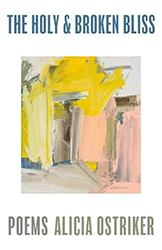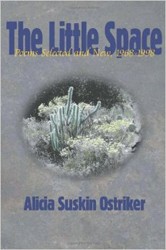Yeats wrote that old men ought to be explorers. In Alicia Ostriker’s book about what old women ought to be, there are ‘red neon EXIT signs everywhere,’ but the poet is not so much concerned with getting out of life — dying — as getting out of life’s comfortable and stifling routines, in search of ‘some wild furious breath.’ The first epigraphs of the book come from Basho and William Carlos Williams, and Ostriker’s language has the limpidness and transparency of great Asian poetry and the energy of Dr. Williams’ American idiom. Of the various educations Ostriker has received in aging,there is the good news that she has ‘learned to be a fool for beauty,’ and, somewhat more disconcertingly, ‘being dead is okay.’ There are poems of keen desire and sweet domesticity. The poet looks askance at both, as in “Our Dead Friend,” when she writes ‘what a joke sex is, though without it/no avenue to paradise/no human glue.’ Many of her metaphors are breathtakingly original, as when she refers to her mind as a cervix, or says ‘To be blessed/said the dog/is to have a pinch/of God/inside you/and all the other dogs/can smell it.’ I found these poems to get stronger, stranger, more religious and more beautiful with each reading. I urge you to spend time with them and ‘drink their bliss.’ The Book of Seventy won the 2009 National Jewish Book Award in Poetry.

Poetry
The Book of Seventy
- Review
By
– August 26, 2011
Jason Myers is a writer whose work has appeared in AGNI, BOOKFORUM, and Tin House.
Discussion Questions

Jewish literature inspires, enriches, and educates the community.
Help support the Jewish Book Council.



